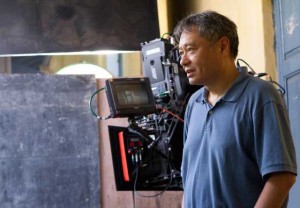
The sound work for Lee’s films has always been exemplary. For Life of Pi, the director’s sound team was led by supervising sound editors Eugene Gearty (effects) and Philip Stockton (dialogue), whose efforts have earned them an Academy Award nomination for best sound editing.
Gearty and Stockton, who have worked on several of Lee’s films, were part of a postproduction team that also included editor Tim Squyres and re-recording mixers Ron Bartlett and Doug Hemphill, who are also Oscar nominees.
Yann Martel’s best-selling novel “Life of Pi” was considered unproducible as a film due to its unusual location – most of the action occurs on a lifeboat in the middle of the ocean – and unique cast – which along with the tiger includes a hyena, a chimpanzee and a zebra. Lee overcame those obstacles, in part, by shooting most of the open water sequences in a large special effects tank in Taiwan and by relying on computer animation for most scenes involving the animals.
Both choices had significant implications for the film’s sound. Stockton explained that the sound editorial team had few production elements to work with. “In the tank shots, you could hear the occasional horn honk and traffic, and there were wind and water machines going a lot of the time,” he said. “As a result, from the beginning of the shipwreck through the end of the movie there were very few usable production dialogue tracks. There are a couple of speeches that Pi gives from the boat, but virtually everything else is replaced dialogue.”
“And of course for the tiger,” Stockton added, “every footstep, every rustle, every growl had to be created from scratch. It was almost like working on an animated film.”
Having worked with the director on a half dozen films, Gearty and Stockton have become well attuned to Lee’s working methods and how he likes to use sound. “He’s very easy going and very supportive, but also very particular,” Stockton said. “He is more concerned with how things make him feel, more about the emotions, than anything else.”
“During the spotting session, Ang will talk in broad strokes about his vision and what he’d like to see, and then we’ll go through it frame by frame, discussing his ideas, how he wants the sound to feel, what things are important and what is less important – as well as the ideas that we bring to it.”
Stockton noted that Lee remains closely involved throughout the process of building the soundtrack and is always seeking ways to improve it. “Often when he sees something again, he becomes inspired and has new ideas,” he noted. “So, it’s a constantly evolving process.”
As an example, Stockton points to a scene from Life of Pi when the lifeboat is inundated by a school of flying fish. Originally, the scene was meant to be accompanied by a music track, but after hearing Gearty’s sound effects, Lee chose to let them play alone. “(Composer) Mychael Danna wrote a beautiful piece of score, but the effects were like music in and of themselves,” Stockton explained. “First there are no fish, then there is one, then more appear. It becomes a combination of fish hitting the boat and fish hitting Pi. They’re zipping and whizzing by. Then one fish flops into the boat and Pi and the tiger fight for it.”
One of the most vexing challenges for the sound team involved the film’s ocean environment. “Eugene wanted to keep the ocean interesting,” Stockton explained. “It’s always there. You’ll hear the atmosphere, a breeze, waves lapping, but sometimes it’s choppy and sometimes it’s calm. Eugene did a fantastic job. It’s always different from moment to moment and scene to scene. That was very important to Ang.”
One of the things that Stockton most enjoys about working with Lee is that he treats his crew as though they are members of his extended family. During the mix sessions, Stockton noted, Lee and the sound crew ate their lunches together often sharing their food “family style.”
“Ang is a very gracious guy,” Stockton said. “When a film wraps, he takes us all out for a Chinese feast at a family restaurant in Manhattan and we get the royal treatment. That’s who he is. He is a sweet and gentle soul and everyone who works with him adores him. He makes the process that much nicer. The fact that he makes great films is an obvious bonus.”
The 60th MPSE Golden Reel Awards will be held Feb. 17 at the Westin Bonaventure Hotel and Suites in Los Angeles.






